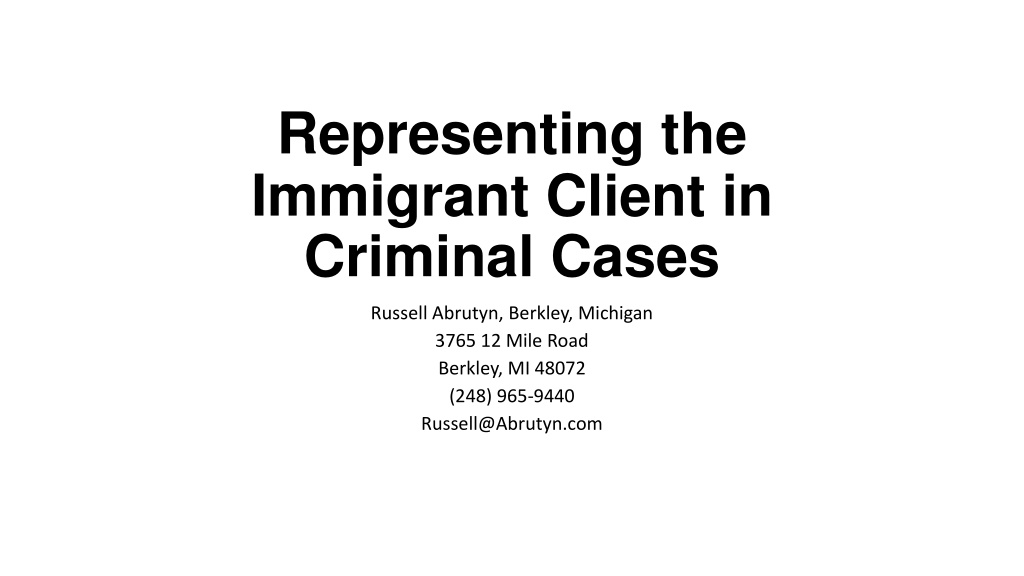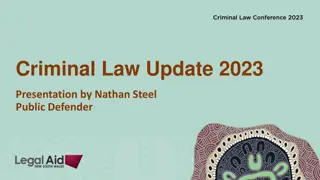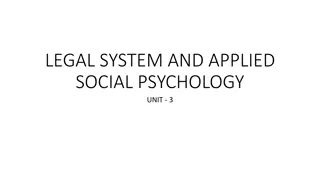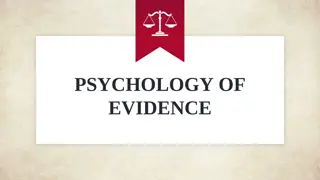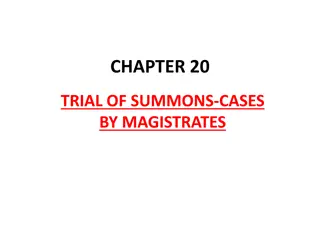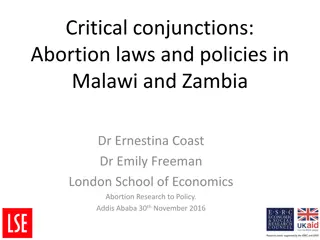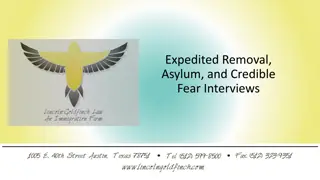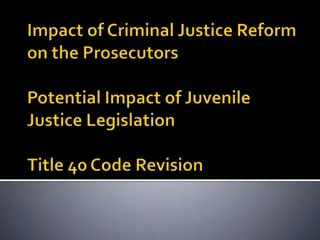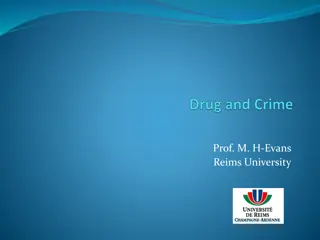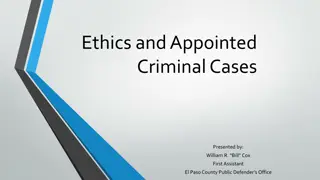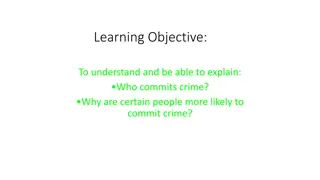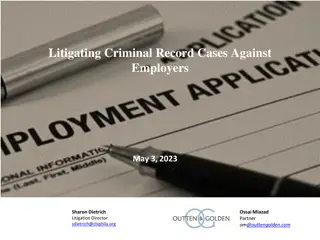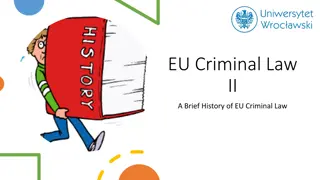Common Grounds for Deportation in Criminal Cases Explained
Providing legal representation to immigrant clients in criminal cases involves understanding common deportation grounds such as felony vs. misdemeanor distinctions, crimes involving moral turpitude, aggravated felonies, and drug offenses. These grounds can impact an individual's immigration status, highlighting the importance of legal guidance and defense strategies to navigate complex legal challenges effectively.
Download Presentation

Please find below an Image/Link to download the presentation.
The content on the website is provided AS IS for your information and personal use only. It may not be sold, licensed, or shared on other websites without obtaining consent from the author. Download presentation by click this link. If you encounter any issues during the download, it is possible that the publisher has removed the file from their server.
E N D
Presentation Transcript
Representing the Immigrant Client in Criminal Cases Russell Abrutyn, Berkley, Michigan 3765 12 Mile Road Berkley, MI 48072 (248) 965-9440 Russell@Abrutyn.com
Common Removal Grounds Felony v. Misdemeanor generally not relevant for immigration purposes Deportation v. Inadmissibility some overlap but some difference
Common Deportation Grounds Crimes Involving Moral Turpitude (CIMT) 8 USC 1227(a)(2)(A)(i) and (ii) Any crime that is base, vile, or depraved and that violates accepted moral standards Mens rea and reprehensible conduct Examples include theft, fraud, certain assault offenses 1 CIMT committed within 5 years of admission, punishable by 1 year or more 2 CIMTs after admission
Common Deportation Grounds Aggravated felonies 8 USC 1101(a)(43) and 1227(a)(2)(A)(iii) Does not have to be aggravated or a felony Based on sentence imposed, including jail time: crime of violence, theft, receipt of stolen property, burglary, racketeering, certain gambling offenses, immigration document counterfeiting, commercial bribery/counterfeiting, obstruction of justice/perjury Crime of violence, 18 USC 16(a) element of use, attempted use, or threatened use of physical force against the person or property of another. 16(b) felony that has substantial risk of physical force against the person or property of another in the course of committing the offense this is void for vagueness, Shuti v. Lynch, 828 F.3d 440 (6th Cir. 2016).
Common Deportation Grounds/Aggr. Felonies Based on reference to a generic offense: murder, rape, sexual abuse of a minor, prostitution businesses, failure to appear Described in certain federal statutes: controlled substance trafficking, money laundering, certain firearms/explosive devices, ransom, child pornography, slavery/trafficking/transportation for prostitution, espionage, alien smuggling, illegal reentry Based on amount of loss: fraud or deceit, certain tax evasion offenses
Common Deportation Grounds Drug Offenses 8 USC 1227(a)(2)(B)(i) Must be listed on the federal drug schedules All but a single conviction for personal possession for one s own use of less than 30 grams of marijuana Note, this safe harbor does not apply to the grounds of inadmissibility
Common Deportation Grounds Firearms offenses 8 USC 1227(a)(2)(C) Purchasing, selling, offering for sale, exchanging, using, owning, possessing, or carrying, or of attempting or conspiring to purchase, sell, offer for sale, exchange, use, own, possess, or carry, any weapon, part, or accessory which is a firearm or destructive device (as defined in section 921(a) of title 18, United States Code.
Common Deportation Grounds Domestic Violence 8 USC 1227(a)(2)(E)(i) crime of violence committed against a protected person 18 USC 16 Crime of violence determined by categorical approach, protected person by circumstance specific approach Violation of Protection Order 8 USC 1227(a)(2)(E)(ii) Does not require a conviction, can be a finding made in a civil proceeding
Common Deportation Grounds Pardons 8 USC 1227(a)(2)(A)(vi) only applies to single/multiple CIMTs, aggravated felonies, and federal high speed flight. Does not apply to drug/firearm/domestic violence removal grounds.
Common Grounds of Inadmissibility Do not always require a conviction Aggravated felonies and firearms offenses are not by themselves grounds of inadmissibility, but may fall into one of the other categories.
Common Grounds of Inadmissibility CIMTs 8 USC 1182(a)(2)(A)(i)(I) Convicted of, or admits having committed, or admits committing acts which constitute the essential elements of Petty offense exceptions for single CIMT maximum potential penalty of 1 year or less, sentence of 6 months or less Juvenile exception for CIMT committed more than 5 years before visa/admission application, under 18 at time of offense
Common Grounds of Inadmissibility Any drug offense, even single conviction for personal possession of less than 30 grams of marijuana (this latter is the only waivable drug offense as part of an application for admission or adjustment of status) 8 USC 1182(a)(2)(A)(i)(II) Convicted of, or admits having committed, or admits committing acts which constitute the essential elements of Reason to believe a drug trafficker 8 USC 1182(a)(2)(C) Drug abuse does not require a conviction requires remission for one year
Common Grounds of Inadmissibility Alcohol related driving offenses As of now, generally do not trigger a criminal ground of inadmissibility But, even an arrest for this type of offense will generally trigger the prudential revocation of a nonimmigrant visa, potentially exposing the nonimmigrant to removal proceedings and requiring a new visa application following a trip abroad Single DUI in 5 years or multiple DUIs in 10 years, or other evidence to suggest problems with alcohol triggers potential medical/health ground of inadmissibility and requires a medical screening by approved physician
Common Grounds of Inadmissibility Multiple convictions resulting in aggregate jail sentences of 5 years of more 8 USC 1182(a)(2)(B) Engaged in prostitution within 10 years, coming to U.S. to engage in prostitution, procurer (pimp), or engaged in unlawful commercialized visa 8 USC 1182(a)(2)(D)
What is a Conviction? 8 USC 1101(a)(48)(A): Formal judgment of guilt, OR Where adjudication of guilt withheld, (a) judge/jury finds alien guilty or plea of guilty or plea of no contest, or admission of sufficient facts to warrant finding of guilt, and (b) imposition of some form of punishment, penalty, restraint on liberty. Includes HYTA (Hanna v. Holder, 740 F.3d 379 (6th Cir. 2014)), 7411, expungements
What is a Conviction? Vacatur on the merits or defect in underlying proceeding Pickering v. Gonzales, 465 F.3d 263 (6th Cir. 2006) Vacated because plea defective because no immigration advice Matter of Adamiak, 23 I&N Dec. 878 (BIA 2006) Resentencing for any purpose effective for immigration purposes Matter of Cota-Vargas, 23 I&N Dec. 849 (BIA 2005)
Analytical Framework for Evaluating Convictions Categorical Approach Moncrieffe v. Holder, 133 S. Ct. 1678 (2013) The court does not look to the facts of the particular prior case, but instead to whether the state statute defining the crime of conviction categorically fits within the generic federal definition of a corresponding removal category Divisible statute Modified Categorical Approach Mathis v. U.S., 136 S. Ct. 2243 (2016) A statute is divisible if it sets out one or more elements in the alternative. A statute is not divisible because there is a range of conduct that would violate it or even because the statute is phrased in the disjunctive
Analytical Framework for Evaluating Convictions Case example - manufacture/delivery of marijuana. MCL 333.7401(2)(d)(3).
Analytical Framework for Evaluating Convictions Circumstance Specific Approach Nijhawan v. Holder, 557 US 29 (2009) In narrowly defined circumstances, can look beyond the statutory elements to consider and rely on factual admissions and findings. Applies to amount of loss for fraud/deceit aggravated felonies, possession of less than 30 grams of marijuana removability exception (Matter of Davey, 26 I&N Dec. 37 (BIA 2012)); identity of victims for crimes of domestic violence (Matter of Estrada, 26 I&N Dec. 749 (BIA 2016)); among other things.
Representing Noncitizen Defendants Effective Assistance of Counsel requires defense attorneys to advise on the immigration consequences of the charge and plea offer. Padilla v. Kentucky, 559 U.S. 356 (2010). The collateral consequences are often more severe than the direct consequences. Both sides should factor it into plea negotiations Misadvice or failure to advise are grounds for setting aside a conviction if there is prejudice. Does not apply retroactively to cases already final on direct review before Padilla s March 31, 2010 decision date. Chaidez v. US, 133 S Ct 1103 (2013). Also People v. Gomez, 295 Mich. App. 411 (2012).
Representing Noncitizen Defendants Showing prejudice Jae Lee v. US, (2017). Strickland standard have to show a reasonable probability that but for counsel s errors, the result of the proceeding would have been different. Rejected 6th Circuit s per se rule that a defendant who pleads guilty where there is strong evidence of guilt could never show prejudice from incompetent immigration advice. Prejudice is context-specific determination that also considers the defendant s ties to the U.S. and desire to remain in the U.S. as well as the likelihood of conviction. If avoiding deportation was the determinative factor, court should consider what the individual defendant would have done, and the possibility of even a highly improbable result may be pertinent to the extent it would have affected his decision making. Look at contemporaneous evidence of defendant s expressed priorities, like communications with defense attorney about immigration issues.
Representing Noncitizen Defendants Immigration laws/interpretations change and can be applied retroactively Some benefits are discretionary and the police report can be considered even if charges are dismissed or there is a plea to a reduced charge For certain benefits, like TPS or DACA, even non-removable convictions can lead to a bar These determinations may be made in non-adversarial settings with few rights, like at a consulate, port of entry, or USCIS officer.
Consequences Beyond Removal Naturalization Good Moral Character 8 CFR 316.10 Murder at any time Aggravated felonies after 11/29/1990 CIMT other than petty offense, during GMC period Multiple crimes resulting in sentence imposed of 5 years or more Drug crimes except simple possession of less than 30 grams Admission to acts including CIMTs and drug crimes Confinement for more than 180 days Involved in prostitution or commercialized vice. Two or more gambling convictions Catch-all provision including committed acts that adversely reflect upon the applicant s moral character
Consequences Beyond Removal Adam Walsh Act 8 USC 1154(a)(1)(A)(viii). USC or LPR who has been convicted of a specific offense against a minor, as defined in 42 USC 16911. Includes nonparental kidnapping, nonparental false imprisonment, solicitation to engage in sexual conduct, use in a sexual performance, solicitation to practice prostitution, video voyeurism, child porn, criminal sexual conduct involving a minor, or any conduct that is by its nature a sex offense against a minor. Uses circumstance-specific approach. Matter of Introcaso, 26 I&N Dec. 304 (BIA 2014). Applies retroactively. Matter of Jackson, 26 I&N Dec. 314 (BIA 2014). Waiver sole and unreviewable discretion of DHS upon a determination that the petitioner poses no risk to the beneficiary.
